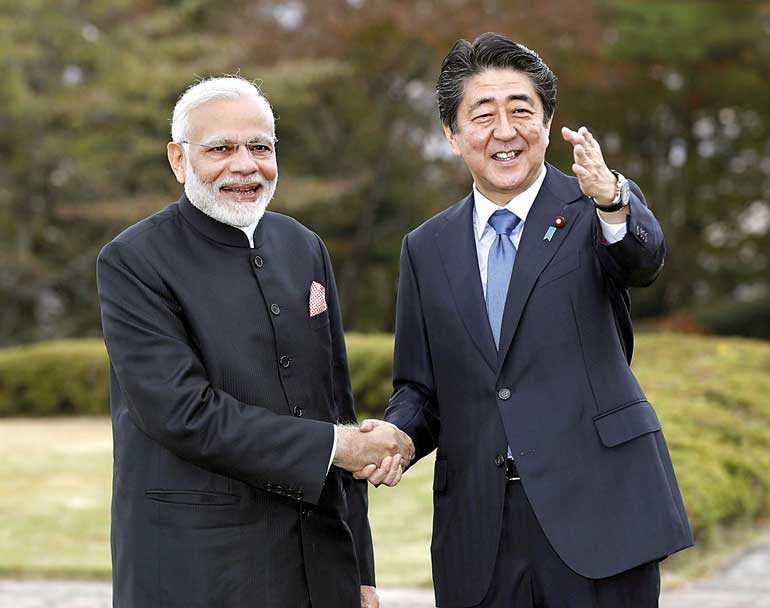Friday Feb 20, 2026
Friday Feb 20, 2026
Tuesday, 30 October 2018 00:05 - - {{hitsCtrl.values.hits}}

Indian Prime Minister Narendra Modi (left) and Japan’s Prime Minister Shinzo Abe shake hands in Yamanakako village, Yamanashi Prefecture, Japan in this photo taken by Kyodo 28 October - Kyodo via REUTERS
TOKYO (Reuters): Indian Prime Minister Narendra Modi and Japanese Prime Minister Shinzo Abe agreed to seek closer economic and military ties on Monday as the Japanese leader extended a diplomatic charm offensive that last week took him to India’s regional rival, China.
In a joint statement, the two leaders said they would begin regular talks between their foreign and defense ministers and committed to extending cooperation in areas ranging from agriculture and digital technology to investment in Indian rail projects and infrastructure.
Abe and Modi also said they would conclude a $75 billion bilateral currency swap agreement and welcomed an agreement to deepen cooperation between their two navies.
“A strong India benefits Japan and a strong Japan benefits India,” Abe told reporters after he and Modi signed the statement.
The talks in Tokyo on Monday followed separate talks on regional issues between the two men the day before at Abe’s vacation home near Mount Fuji, the first time he has invited a foreign leader to his private lodge.
India and Japan have drawn closer as China’s power in Asia has grown. Tokyo is worried about Chinese activity in the Western Pacific. Delhi wants to keep Beijing influence out of the Indian Ocean.
In 2015, Japan’s Maritime Defence Force became a regular participant in an annual naval exercise, known as Malabar, that the United States and India began in 1992.
Delhi and Tokyo this month began talks on a military logistics pact, known as a Acquisition and Cross Servicing Agreement (ACSA). It would allow Japan to refuel and resupply its ships at Indian naval bases on the Andaman and Nicobar islands near the Malacca Straits, a maritime choke point through which seaborne trade passes on route to ports in China, Japan and elsewhere.
Japan may also supply the Indian navy with amphibious US-2 aircraft, although the two countries have yet to conclude a deal after five years of negotiations.
Yet as cooperation between Japan and India grows, Abe is also seeking to improve ties with China.
Abe last week visited Beijing for talks with President Xi Jinping and Premier Li Keqiang in a bid to ease tensions and forge economic cooperation.
India and Japan signed a $75 billion bilateral currency swap agreement on Monday, India said, adding the measure was aimed at improving confidence in the foreign exchange and capital markets.
New Delhi said the value of the deal was 50% higher than the last currency swap between the two countries, signed in 2014 and effective here until December 2015.
China and Japan on Friday signed a broad range of agreements including a $30 billion currency swap pact, amid rising trade tensions with Washington.